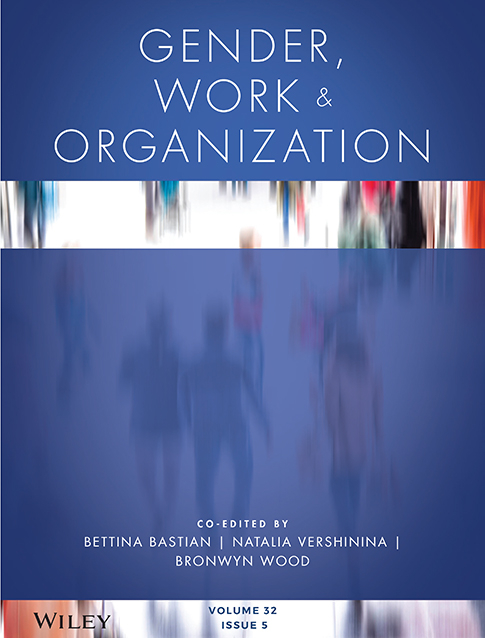Can running a business help mothers rewrite the rules of parenting?
Magdalena Markowska, Helene Ahl, Lucia Naldi
Audio > Play / Stop
CeFEO's Authors
CeFEO counts more than 50 scholars and 30 affiliated researchers. Several studies and reports have consistently identified CeFEO as a leading research environment worldwide in the area of ownership and family business studies.
This research project, has been co-authored by the following CeFEO Members.
Reference
Spotlight highlights research-based findings only. If you’re interested in exploring this project further or delving into the theoretical and methodological details, we encourage you to contact the authors or read the full article for a comprehensive understanding.

Markowska, M., Ahl, H., & Naldi, L. (2025). “My Child Has Two Parents”: Swedish Women Entrepreneurs Doing and Undoing Their Motherhood. Gender, Work & Organization.
https://doi.org/10.1111/gwao.13272

What is Spotlight?
Spotlight is an innovative online family business magazine designed to bridge the gap between cutting-edge research and the real-world needs of practitioners, owners, and policymakers. Drawing on the latest findings from the Centre for Family Entrepreneurship and Ownership (CeFEO) at Jönköping International Business School, Spotlight delivers insightful, accessible summaries of key research topics. Our mission is to keep the family business community informed and empowered by offering actionable insights, expert analyses, and forward-thinking strategies that enhance business leadership and ownership practices for long-term success.

This article is brought to you by the WIFU Foundation
Spotlight is generously supported by the WIFU Foundation, which promotes research, education, and dialogue in the field of family business. This partnership enables us to continue bridging academic insights and real-world practice for the advancement of responsible family entrepreneurship and ownership.
Redefining motherhood through entrepreneurship in Sweden
What does it mean to be both a mother and an entrepreneur? For generations, women have been told that “good mothers” sacrifice professional ambition for their children. Yet, in Sweden, a group of women entrepreneurs are reshaping that story. Through interviews with 15 mothers who started ventures while raising small children, this study reveals how entrepreneurship can become a tool for undoing restrictive motherhood norms and creating new models of parenting and leadership. These women show that being a good mother is not about self-sacrifice, but about being fulfilled, balanced, and able to share responsibilities with a partner.
What does it mean to be both a mother and an entrepreneur? For generations, women have been told that “good mothers” sacrifice professional ambition for their children. Yet, in Sweden, a group of women entrepreneurs are reshaping that story. Through interviews with 15 mothers who started ventures while raising small children, this study reveals how entrepreneurship can become a tool for undoing restrictive motherhood norms and creating new models of parenting and leadership. These women show that being a good mother is not about self-sacrifice, but about being fulfilled, balanced, and able to share responsibilities with a partner.
Family business leaders know that the family and the firm are inseparable. But for women, the balance often comes with added weight. In many societies, motherhood still carries the expectation of selflessness, presence, and priority over everything else—including career. Meanwhile, entrepreneurship demands long hours, passion, and commitment. The clash between these expectations has created what scholars call a double bind: mothers who also lead businesses are expected to be both endlessly available at home and tireless entrepreneurs at work .
The study at the heart of this article asks: how do women entrepreneurs in Sweden navigate this double bind? Sweden is particularly relevant, as it combines strong welfare policies (parental leave, subsidized daycare, individual taxation) with a cultural commitment to gender equality . Yet even here, mothers still feel the pull of “intensive parenting” norms, where maternal presence is seen as the ultimate marker of a good parent .
For family businesses, these findings are more than theoretical. They provide a glimpse into how entrepreneurial mothers craft their roles in ways that strengthen both their families and their ventures—lessons that apply well beyond Sweden.
What We Studied
The research draws on 45 life-story interviews with 15 Swedish women entrepreneurs who became business owners while raising young children. These women came from diverse sectors: fashion, food, jewelry, design, marketing, and more (see Table 1 in the article). Most were married or cohabiting, middle-class, and well-educated.
The life-story method gave space for the women to narrate their own experiences, blending professional ambitions with family realities. Interviews were conducted three times over three years, allowing researchers to trace how their views on motherhood evolved .
Using thematic analysis, the researchers identified patterns in how these women constructed their identities as both mothers and entrepreneurs. Two strategies stood out:
- Coalescing – blending the maternal and professional selves.
- Gender abating – stripping motherhood of its gendered expectations and reframing it as shared parenthood.
These strategies reveal how entrepreneurship can be not only a career path but also a platform for reshaping cultural norms of family life.
Key Insights
1. Navigating Between Ideal, Actual, and Normative Motherhood
For many participants, motherhood meant juggling three overlapping “selves”:
- Ideal motherhood – the dream of being present and nurturing.
- Normative motherhood – the socially expected, often self-sacrificing, mother.
- Actual motherhood – their lived experience of balancing children, work, and personal fulfillment .
Take Katarina, a granola maker. She imagined motherhood as keeping her children close, much like her farm upbringing. Yet she also longed for personal growth and professional projects. Her motherhood became not just about caregiving but about birthing her own ideas. Similarly, Sofia, a jeweler, rejected the “baby activity” culture expected of new mothers, instead sharing parental leave with her partner so she could continue developing her business.
These narratives show a subtle but powerful shift: being a good mother was not about constant presence, but about authenticity and fulfillment.
2. Coalescing: Blending Work and Family
Rather than separating family and business, many women wove them together. Entrepreneurship became an extension of motherhood, not its competitor.
- Charlotta, a fashion entrepreneur, emphasized quality over quantity: “When you are with your kids, just focus on them.” Her point was that being fully present during family time mattered more than being present all the time.
- Frida, a media sales professional, worked extensively during her second maternity leave but argued that doing so made her a better mother: “Without a happy mother, there will be no happy child.”
- Moa, a designer, viewed her parental leave as a chance to throw herself into her venture: “I was overjoyed because now I could work full-time with this project.”
This coalescing strategy reframes motherhood as compatible with entrepreneurship. The women did not see themselves as sacrificing one role for the other, but as integrating them into a fuller identity.
3. Gender Abating: From Mother to Parent
Perhaps the most radical insight was the insistence that “my child has two parents.”
Women deliberately pushed back against the assumption that mothers must shoulder the majority of care. For example:
- Helena, a marketing professional, quickly returned to work while her husband stayed home with their children. She stated bluntly: “I am a feminist. We must downsize the importance of a mother. It is parenting that matters.”
- Frida questioned everyday expectations: “Why is it always me who should stay home when my child is sick or take them to the dentist? Their father can do it equally well.”
- Linnea, a vegan baby-food entrepreneur, disliked being told to “think like a mother.” Her response was firm: “I am a parent, and my child has two parents.”
By abating gendered expectations, these women normalized shared responsibility, aligning their practices with Sweden’s dual-earner cultural model. This shift reduced guilt, empowered their ventures, and modeled equality for their children.
4. Entrepreneurship as a Vehicle for the Self
For many participants, their ventures were more than businesses—they were personal projects of identity and meaning.
- Zoe, a children’s clothing entrepreneur, built her company around gender-neutral clothing to undo stereotypical color norms. Her business became a feminist statement as well as a commercial venture.
- Lisa, who created a maternity sportswear brand, connected her business to her traumatic childbirth experience. She partnered with charities to support safe deliveries in developing countries, turning her business into a vehicle for social change.
- Fanny, an ice-cream maker, described how entrepreneurship made her “more self-secure” and a happier parent.
The repeated metaphor of the “business as a baby” appeared often. These ventures were not side projects but deeply integrated into the women’s sense of who they were and what kind of mothers they wanted to be.
Takeaways for Family Businesses
1. Equal Parenting Strengthens Family Firms
When both parents share caregiving, mothers can invest in entrepreneurship without guilt. Family businesses thrive when leadership is not constrained by gendered parenting roles.
2. Entrepreneurship Is More Than Work
For women, entrepreneurship is often an identity project. Family firms should recognize and support this deeper motivation, which sustains resilience and long-term vision.
3. Context Matters
Sweden’s welfare system enabled these women to reimagine motherhood. In contexts without such support, the burden falls more heavily on individual families. This highlights the importance of aligning policy, culture, and family business practices.
Impact
This study disrupts the cultural script of the “self-sacrificing mother.” Instead, it introduces a new discourse: the fulfilled, balanced, role-model mother.
For family businesses, this matters because:
- It validates women’s leadership within entrepreneurial families.
- It demonstrates that parenthood does not have to conflict with entrepreneurship—it can enrich it.
- It suggests that future generations may grow up with broader role models of what mothers and fathers can be.
By coalescing work and family, and by abating gendered expectations, these women show that motherhood itself can evolve.
Recommendations
- For Family Business Leaders: Normalize co-parenting practices within entrepreneurial families. Encourage fathers’ visible participation in both childcare and business.
- For Policymakers: Recognize that welfare policies are also entrepreneurship policies. Affordable childcare and parental leave unlock women’s potential as business creators.
- For Researchers: Extend this inquiry to other contexts—what happens in countries without Sweden’s egalitarian system? How do single mothers navigate entrepreneurship? What lessons can global family firms draw?

CeFEO's Authors
CeFEO counts more than 50 scholars and 30 affiliated researchers. Several studies and reports have consistently identified CeFEO as a leading research environment worldwide in the area of ownership and family business studies. This research project, has been co-authored by the following CeFEO Members.
Reference
Spotlight highlights research-based findings only. If you’re interested in exploring this project further or delving into the theoretical and methodological details, we encourage you to contact the authors or read the full article for a comprehensive understanding.

Markowska, M., Ahl, H., & Naldi, L. (2025). “My Child Has Two Parents”: Swedish Women Entrepreneurs Doing and Undoing Their Motherhood. Gender, Work & Organization.
https://doi.org/10.1111/gwao.13272

What is Spotlight?
Spotlight is an innovative, AI-powered, online family business magazine designed to bridge the gap between cutting-edge research and the real-world needs of practitioners, owners, and policymakers. Drawing on the latest findings from the Centre for Family Entrepreneurship and Ownership (CeFEO) at Jönköping International Business School, Spotlight delivers insightful, accessible summaries of key research topics. Our mission is to keep the family business community informed and empowered by offering actionable insights, expert analyses, and forward-thinking strategies that enhance business leadership and ownership practices for long-term success.

This article is brought to you by the WIFU Foundation
Spotlight is generously supported by the WIFU Foundation, which promotes research, education, and dialogue in the field of family business. This partnership enables us to continue bridging academic insights and real-world practice for the advancement of responsible family entrepreneurship and ownership.










